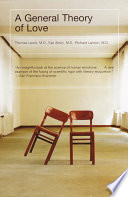English [en], .epub, 🚀/lgli/lgrs/nexusstc/upload/zlib, 2.2MB, 📘 Book (non-fiction), upload/bibliotik/T/Thomas Lewis - A General Theory of Love.epub
A General Theory of Love 🔍
Knopf Doubleday Publishing Group;Vintage, New York, 2007
Amini, Fari;Lewis, Thomas;Lannon, Richard 🔍
description
Drawing comparisons to the most eloquent science writing of our day, three eminent psychiatrists tackle the difficult task of reconciling what artists and thinkers have known for thousands of years about the human heart with what has only recently been learned about the primitive functions of the human brain. The result is an original, lucid, at times moving account of the complexities of love and its essential role in human well-being. A General Theory of Love draws on the latest scientific research to demonstrate that our nervous systems are not self-contained: from earliest childhood, our brains actually link with those of the people close to us, in a silent rhythm that alters the very structure of our brains, establishes life-long emotional patterns, and makes us, in large part, who we are. Explaining how relationships function, how parents shape their child's developing self, how psychotherapy really works, and how our society dangerously flouts essential emotional laws, this is a work of rare passion and eloquence that will forever change the way you think about human intimacy. From the Trade Paperback edition.
Alternative filename
lgrsnf/Z:\Bibliotik_\30\T\%&Ovr1\Thomas Lewis - A General Theory of Love.epub
Alternative filename
lgli/Z:\Bibliotik_\30\T\%&Ovr1\Thomas Lewis - A General Theory of Love.epub
Alternative filename
nexusstc/A General Theory of Love/6307665a821f5ff987cb6a7f6381ba35.epub
Alternative author
Lewis, Thomas, Amini, Fari, Lannon, Richard
Alternative author
Thomas Lewis, Fari Amini, Richard Lannon
Alternative publisher
Golden Books Publishing Company, Incorporated
Alternative publisher
Random House, Incorporated
Alternative publisher
Vintage Books
Alternative edition
United States, United States of America
Alternative edition
Reprint, 2007
Alternative edition
S.I, 2007
Alternative edition
uuuu
metadata comments
lg2580751
metadata comments
{"isbns":["0307424340","9780307424341"],"publisher":"Knopf Doubleday Publishing Group;Vintage"}
Alternative description
This original and lucid account of the complexities of love and its essential role in human well-being draws on the latest scientific research. Three eminent psychiatrists tackle the difficult task of reconciling what artists and thinkers have known for thousands of years about the human heart with what has only recently been learned about the primitive functions of the human brain.
A General Theory of Love demonstrates that our nervous systems are not self-contained: from earliest childhood, our brains actually link with those of the people close to us, in a silent rhythm that alters the very structure of our brains, establishes life-long emotional patterns, and makes us, in large part, who we are. Explaining how relationships function, how parents shape their child’s developing self, how psychotherapy really works, and how our society dangerously flouts essential emotional laws, this is a work of rare passion and eloquence that will forever change the way you think about human intimacy.
A General Theory of Love demonstrates that our nervous systems are not self-contained: from earliest childhood, our brains actually link with those of the people close to us, in a silent rhythm that alters the very structure of our brains, establishes life-long emotional patterns, and makes us, in large part, who we are. Explaining how relationships function, how parents shape their child’s developing self, how psychotherapy really works, and how our society dangerously flouts essential emotional laws, this is a work of rare passion and eloquence that will forever change the way you think about human intimacy.
date open sourced
2020-07-26
🚀 Fast downloads
Become a member to support the long-term preservation of books, papers, and more. To show our gratitude for your support, you get fast downloads. ❤️
- Option #1: Fast Partner Server #1 (recommended) (open in viewer) (no redirect) (no browser verification or waitlists)
- Option #2: Fast Partner Server #2 (open in viewer) (no redirect)
- Option #3: Fast Partner Server #3 (open in viewer) (no redirect)
- Option #4: Fast Partner Server #4 (open in viewer) (no redirect)
- Option #5: Fast Partner Server #5 (open in viewer) (no redirect)
- Option #6: Fast Partner Server #6 (open in viewer) (no redirect)
🐢 Slow downloads
From trusted partners. More information in the FAQ. (might require browser verification — unlimited downloads!)
- Option #1: Slow Partner Server #1 (slightly faster but with waitlist)
- Option #2: Slow Partner Server #2 (slightly faster but with waitlist)
- Option #3: Slow Partner Server #3 (no waitlist, but can be very slow)
- After downloading: Open in our viewer
External downloads
All download options have the same file, and should be safe to use. That said, always be cautious when downloading files from the internet, especially from sites external to Anna’s Archive. For example, be sure to keep your devices updated.
-
For large files, we recommend using a download manager to prevent interruptions.
Recommended download managers: JDownloader -
You will need an ebook or PDF reader to open the file, depending on the file format.
Recommended ebook readers: Anna’s Archive online viewer, ReadEra, and Calibre -
Use online tools to convert between formats.
Recommended conversion tools: CloudConvert -
You can send both PDF and EPUB files to your Kindle or Kobo eReader.
Recommended tools: Amazon‘s “Send to Kindle” and djazz‘s “Send to Kobo/Kindle” -
Support authors and libraries
✍️ If you like this and can afford it, consider buying the original, or supporting the authors directly.
📚 If this is available at your local library, consider borrowing it for free there.
Total downloads:
A “file MD5” is a hash that gets computed from the file contents, and is reasonably unique based on that content. All shadow libraries that we have indexed on here primarily use MD5s to identify files.
A file might appear in multiple shadow libraries. For information about the various datasets that we have compiled, see the Datasets page.
For information about this particular file, check out its JSON file. Live/debug JSON version. Live/debug page.
